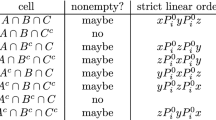Abstract
We model constitutions by effectivity functions. We assume that the constitution is common knowledge among the members of the society. However, the preferences of the citizens are private information. We investigate whether there exist decision schemes (i.e., functions that map profiles of (dichotomous) preferences on the set of outcomes to lotteries on the set of social states), with the following properties: (i) The distribution of power induced by the decision scheme is identical to the effectivity function under consideration; and (ii) the (incomplete information) game associated with the decision scheme has a Bayesian Nash equilibrium in pure strategies. If the effectivity function is monotonic and superadditive, then we find a class of decision schemes with the foregoing properties.



Similar content being viewed by others
Notes
The Borda count is originally defined for strict orderings, however, it can be extended to weak preference orderings as follows: Given \(R\in W\) and \(x\in A\), the Borda count of \(x\) is the average of the Borda counts of the elements of its equivalence class (in \(R\)) in a strict preference ordering \(Q\) on \(A\) that preserves the strict preferences in \(R\), that is if \(x\) is strictly preferred to \(y\) according to \(R\) then \(xQy\) (it is easily verified that this is well defined that is, it is the same for any such \(Q\)).
A representation \(d\) of \(E\) satisfies the CC if for all \(R^N\in W^N\), if \(c\in A\) beats every \(b\in A\setminus \{c\}\) by simple majority rule, then \(d(c, R^N)=1.\)
References
Abdou, J., Keiding, H.: Effectivity functions in social choice. Kluwer, Dordrecht (1991)
d’Aspremont, C., Peleg, B.: Ordinal Bayesian incentive compatible representations of committees. Soc. Choice Welf. 5, 261–279 (1988)
Arrow, K.J.: Social Choice and Individual Values. Wiley, New York (1951, 1963)
Gardenfors, P.: Rights, games, and social choice. Nous 15, 341–356 (1981)
Gibbard, A.: A Pareto-consistent libertarian claim. J. Econ. Theory 7, 388–410 (1974)
Keiding, H., Peleg, B.: Binary effectivity rules. Rev. Econ. Des. 10, 167–181 (2006)
Peleg, B.: Effectivity functions, game forms, games, and rights. Soc. Choice Welf. 15, 67–80 (1998)
Peleg, B., Peters, H.: Strategic Social Choice. Springer, Berlin (2010)
Peleg, B., Peters, H., Storcken, T.: Nash consistent representation of constitutions: a reaction to the Gibbard Paradox. Math. Soc. Sci. 43, 267–287 (2002)
Suzumura, K.: Welfarism, individual rights, and procedural fairness. In: Arrow, K.J., Sen, A., Suzumura, K. (eds.) Handbook of Social and Welfare, Volume 2, Chapter 23. North-Holland, Amsterdam (2011)
Acknowledgments
We are indebted to three anonymous referees for their helpful comments.
Author information
Authors and Affiliations
Corresponding author
Rights and permissions
About this article
Cite this article
Peleg, B., Zamir, S. Representation of constitutions under incomplete information. Econ Theory 57, 279–302 (2014). https://doi.org/10.1007/s00199-014-0816-0
Received:
Accepted:
Published:
Issue Date:
DOI: https://doi.org/10.1007/s00199-014-0816-0




